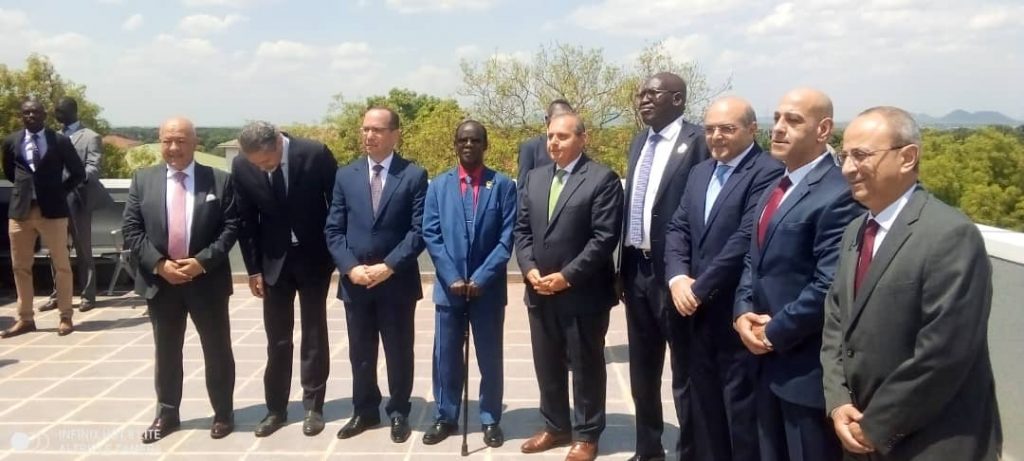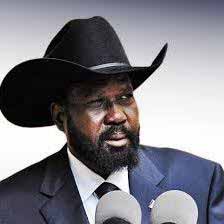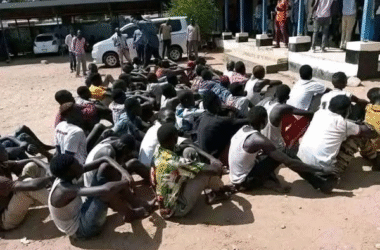
By Ephraim Modi D.S
The National Bank of Egypt on Tuesday opened its first ever branch in South Sudan capital Juba aimed at boosting trade between Egypt and South Sudan.
The launch was graced by the Country’s Vice President for Economic Cluster Dr. James Wani Igga, in attendance was also Governor of the Central Bank of South Sudan Moses Makur Deng, among other government officials, and staff of the bank.
Speaking at the inauguration of the Egyptian first bank in South Sudan, Vice President Dr. Igga said the opening of the bank is a way of creating a bond between Cairo and Juba.
“This will strengthen the relationship between the two countries in terms of trade, in terms of economics and many other things,” Dr. Igga said.
The Vice President for Economic Cluster said that the national bank of Egypt has been granted rights to function in the country by leaders of the two countries.
“This bank has been allowed by the two leaders to come and operate in South Sudan,” Vice President Dr. Igga asserted about the operations of the bank in Juba.
“Definitely, the people of South Sudan must find this as an opportunity to celebrate because from the business group, it is really going to facilitate their work,” he added.
However, the Chairperson of the Board for National Bank of Egypt Mr. Hisham Okasha said the bank is one of the largest in Egypt founded long time ago.
“It is the largest bank in Egypt, it was established since 1898, and we have a very strong strategy of expansion within Africa,” Mr. Okasha said.
Mr. Okasha has expressed his happiness as the inauguration of the bank in Juba was accompanied by 124th celebration of the National Bank of Egypt since its establishment in June 25, 1898.
He said the bank has a very wide presence around Africa and the world at large that will in fact their existence in Juba will create an impact in Africa as a whole.
The board chair said it is a good time to expand and add value out of the resources in Africa, for African economy and African countries to collaborate together since Africa has a lot of resources.
The National Bank of Egypt Board Chairperson reiterated that the launching of the bank in Juba is part of the creation of political or economic relationship between the Egypt and South Sudan.
He commended the leadership of President Slava Kiir Mayardit and the presence of Vice President for Economic Cluster Dr. Wani Igga for giving them a space in the banking sector in the county.
A report of the Sentry, states that South Sudan’s banks should be a political engine of South Sudanese economy, catalyzing business investment. But instead, some of these banks are corrupted institutions used by political elites to transfer ill-gotten gains abroad at expense of providing capital and facilitating trade for millions of citizens suffering from more than five years of war.
It continued that many politically exposed persons (PEPs) in banking terminology, their relatives and associates exploit privileged access to bank services or control banks outright.
The war economy built on PEPs’ control of banks and capture of oil profits, benefits the elites even as most citizens suffer the devastating consequences of persistent inflation.
While banks can be channels of corruption, the country’s peace, development and economic future also depend on local banks and through correspondent banks, the global financial system.
Without reforms, however, there is little chance international donors, banks and investors will trust the country’s banking system enough to finance South Sudan’s peace and stability.
Next step for peace-focused policymakers, coalition of regional mediators of peace, local civil society and international supporters of peace process is to dialogue with banks and position them to support the economy.
International banks, policymakers and others committed to peace, good governance and development in the country must find joint solutions to the deficiencies in East Africa’s corresponding banking network, address regulatory and compliance gaps and correct PEP influence in the country’s banking sector to set the country on the right economic course.



